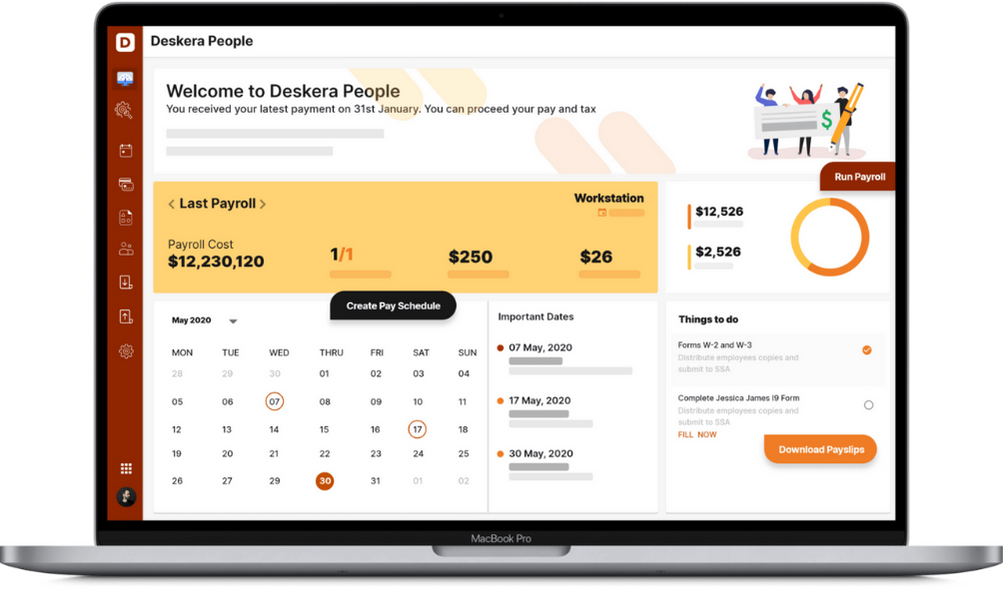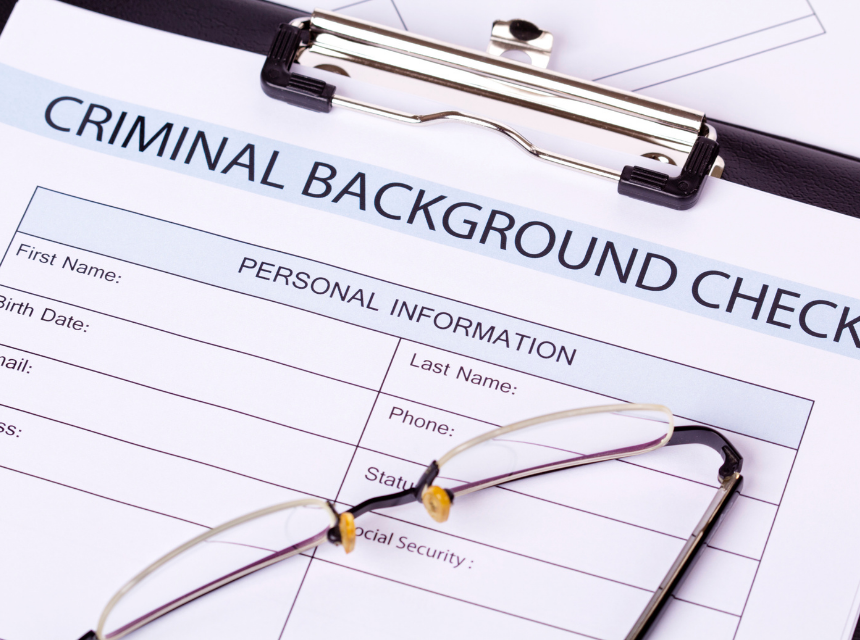Do you know that 53% of all job applications contain inaccurate information? According to Wall Street Journal, nearly one out of every 3 Americans have a criminal record of some kind. Surprised, isn’t it?
Are you looking for a new hire but afraid of making a bad decision? Conducting a background check is the solution. Do you know what is a background check and how to conduct it? If the answer is no, read on to get answers to your questions related to background checks.
Table of Contents
- What is a background check?
- Why do you need to conduct an employee background check?
- What does a background check cover?
- What should not be covered in the background checks?
- CRAs and FCRA regulations
- How to conduct an employment background check?
- Communicate with your candidates regarding the background check process
- What background checks do most employers use?
- What is the reason for a red flag on a background check?
- What are pre-employment background checks?
- How long does a pre-employment background check take?
- Can you run a background check on existing employees?
What is a Background Check?
A background check is a type of evaluation method that is used by employers in order to check whether the information provided by the job candidate is correct or not. It is done to point out any potential red flags with a candidate so that there are no hassles later. During a background check, usually, a third party verifies employment history, education, criminal records, credit score, driving records, and the list goes on. Conducting background checks is a good way to make smart hiring decisions. However, you need to ensure that your background check process is fair and legal.
Why Do You Need to Conduct an Employee Background Check?
In most cases, employment background checks are not required legally. Still, they are conducted because they provide value. According to a survey in 2019, 86% of employers conducted background checks on full-time employees while 67% of employers conducted these checks on part-time employees. Let’s take a look at the benefits of conducting background checks:
Ensure workplace safety
As an employer, it is your responsibility to keep the workplace safe not only for the employees but also for the customers that visit your office. For example, if you hire someone without conducting a background check, and he/she starts harming your other employees, then you might have to face claims for negligent hiring. That is why conducting an employee background check is a must.
Reduce employee dishonesty
Every employee has certain roles and responsibilities in the workplace. They contribute in some way or the other in the daily operations of the business. You rely on them to perform their duties fairly. In case a candidate has a record of dishonest behavior including theft, fraud, etc. then a background check can be helpful in revealing the truth. The past may not disqualify a candidate completely, but it can help you to keep the employee away from sensitive or confidential content of the company.
Verify employment qualification
According to a survey, 58% of the managers found lies in the resume of the candidates. This is where a background check comes into play. It helps to identify any false reports and ensure that the candidates you are hiring have provided accurate information.
Increase legal compliance
In the U.S., every employee you recruit needs to be authorized to work in the country. There are certain industries where employees are required to possess certain qualifications in order to fulfill their job duties.
Background checks help to verify whether the candidates are authorized to work in the roles they applied for. For example, if a commercial driving applicant has a suspended license, he cannot perform the job. A background check can help you in preventing such cases.
Background checks help to reveal past mistakes, however, they do not necessarily indicate future behavior. That is why it is important to consider a number of factors such as the nature and gravity of the offense, time that has passed, nature of the job, and a lot more.
What does a Background Check Cover?
A background check includes the following:
- Credit information
- Criminal records
- Educational records
- Employment records
- Military records
- Driving records
- Licensing records
- Civil court records
- Tax liens
- Worker’s compensation records
- UCC filings
Remember that all the information cannot be used for each job applicant. The information that can you can use from the background check results is the information that is related to the position the applicant has applied for. For example, you check credit scores as part of the background check process. But you need to remember that credit scores are only related to financial decisions or company funds. So, for positions outside finance and executive administrators, credit scores are unnecessary.
What Should Not Be Covered in the Background Checks?
While conducting a background check, one should refrain from searching the following criteria. Let’s take a look:
- Medical histories and disabilities
- Genetics
- Age
- Race and color
- National origin
- Sex
- Religion
CRAs and FCRA Regulations
A comprehensive background check cannot be conducted on your own. If you have just started your own business, you won’t have access to criminal records databases and credit histories. Most businesses rely on two common sources for background checks. Background checks are mostly conducted by third-party service providers.
According to Fair Credit Reporting Act (FCRA), background checks are conducted by Consumer Report Agencies (CRAs). The FCRA is the primary federal law governing background checks and FCRA rules apply to every consumer report. Since background checks act as consumer reports, FCRA rules apply to your background check policies and procedures.
There are a number of businesses that qualify as CRAs:
- Credit bureaus (e.g., Equifax, Experian, TransUnion)
- Private investigators
- Collection agencies
- Detective agencies
- Internet and social media background screening providers
The CRA you choose for your background check will depend on the information you want to reap. In case you are interested in the credit history of the applicant, a credit bureau is the best option for you. For reviewing criminal records, media mentions, or character references, you will require a CRA with more extensive services.
How to Conduct an Employment Background Check?
There are various steps to conduct an employment background check. Let’s take a look:
Create a Background Check Policy
A background check policy is essential for showcasing the details of your screening program. It should include the following:
- Determine the type of background checks
It is very important to understand what types of background checks will be conducted, and for whom. Make sure you create the employment background screening package according to the job position offered. For example, you can conduct credit checks for positions related to money, and conduct driving record checks for job positions related to operating motor vehicles.
- Consider some factors
Your background check policy needs to specify what kind of information is required to make employment decisions. There are some factors that need to be considered including the nature of the position sought, the nature of the crime, and the amount of time since the mistake occurred.
- Consider the Time of Conducting Background Checks
You need to mention during which recruitment stage you plan to screen candidates. According to federal law, you can screen the employees at any stage after considering the candidate’s consent. However, the state and local laws can vary and can be more restrictive.
When you have a written background check policy, it makes the process seamless, fair, and transparent. This further helps to prevent discrimination, and avoid litigation and enforcement from federal agencies.
Compliance: Background checks for Employment and the Law
Background checks are driven by federal, state, and local laws, and the employer needs to comply with these laws. If he fails to do this, it may result in heavy fines, settlements, and lawsuits.
Let’s take a look at potential violations that you need to be aware of:
- Consent forms: According to the FCRA (Fair Credit Reporting Act), employers have to inform their applicants in writing that a background check will be conducted for employment purposes. This needs to be clear and should be provided as a stand-alone document.
- Adverse action: According to the FCRA, employers need to follow the three-step adverse action process when they decide to an adverse action based on the results of a background check. They are required to submit a pre-adverse action notice with a copy of the background report and a Summary of Rights. Then ample time should be given to reply prior to sending an adverse action notice.
- Ban-the-box: These regulations vary according to states and municipalities. But in most cases, a background check is required to be delayed until the first interview or after a conditional offer is made. Ban-the-box laws may impact the adverse action process, so it is advisable to check the laws that apply related to this.
- Title VII: Owing to the enforcement of Title VII of the Civil Rights Act of 1964, employer discrimination based on race, color, religion, sex, or national origin is prohibited. Sometimes background screening policies can lead to adverse treatment toward a protected group, especially minority populations.
Choose a Suitable Background Check Company
Since every company is unique, it is very important to choose a suitable background check provider that caters to your specific requirements. The background check company depends on a number of factors such as business size, the number of locations, budget, hiring volume, background screening policy, in-house legal counsel, and a lot more. Let’s take a look at some of the features that can be considered:
- Built-in Compliance: Make sure the company you choose meets the FCRA regulations in order to reduce the risk of unfair hiring practices, lawsuits, and penalties related to EEOC, ban the box, and local regulations —especially if you hire across multiple locations.
- Flexible Packages: Try to avoid over-screening candidates and decrease processing times with a suitable background check based on your industry, position type, and county.
- A Good Candidate Experience: Make sure the background company you choose opts for a transparent process for candidates by providing the facility to log in and check their own background check status and report.
Communicate with your Candidates Regarding the Background Check Process
Make sure you communicate with the candidates regarding your background check process so that they become aware of the same. Tell your candidates why you are conducting the background check, and be open to hearing their thoughts. Ensure that the candidates are able to see the background results, discuss inaccurate information, etc.
What Background Checks Do Most Employers Use?
There are various types of background checks used by employers. However, there are some common background checks used by most employers:
Criminal Records
Checking criminal records is the most common practice of a background check process. This is done to enquire about the applicant’s past criminal activity and also to determine whether the applicant poses any type of threat to the workplace or the customers. The following searches are included in a criminal background check:
- Crime databases on a wider scale
- The justice courts of the county
- Criminal backgrounds from the federal as well as state levels
- Registries with sex offenders
- Terror watch lists exist both in the United States and around the world
You need to remember there are different types of criminal background checks in different states, such as a name-based search of job records or a national fingerprint-based check. You need to be aware of your state's laws regarding the same.
Employment records
Verifying the applicant’s past work experience is one of the most important background checks conducted by employers. This can further help to highlight career stability and loyalty to a company. Employers usually verify the dates of work start and finish, salary for the titles held. Job responsibilities, the reason for termination or departure from the company. Before making a job offer, double-check the claims made by the candidate regarding his work history.
Education records
Education verification is done to assess the education of the applicant written on his resume. The CRA contacts the educational institutions to verify your degree, course of study, professional license, etc. Student records, transcripts, and degrees are verified to provide protection against any fraudulent information regarding the same.
Reference Check
Most employers try to obtain references from job applicants. This is done to get a clear idea of whether the potential employee would fit into the company or not. Employers can ask open-ended questions while checking references so that they can obtain maximum information about the candidate from the reference.
Drug Testing
In certain industries such as aviation, regular drug and alcohol testing is required. These tests are performed to ensure that the employee is in good mental condition, and can perform their duties in the best manner. Remember that such types of tests can be done only with permission.
What is the Reason for a Red Flag on a Background Check?
The background screening process is easier to conduct than most employers think. However, there are some red flags on a background check including criminal records, derogatory marks, poor credit history, bad references, and application discrepancies.
What are Pre-Employment Background Checks?
Background checks are mostly conducted during the pre-employment process for candidates. These checks help to reveal misdemeanors, convicted felonies, FBI records, judgments, etc. Education and employment verification are also included in pre-employment background checks. This ensures that the potential candidate went to the educational institutes listed on his resume and worked for the same employers as listed on the resume. Reference checks can also be conducted during this time.
The candidate’s credit history can also be checked during a pre-employment background check. However, this needs to be only checked if the job position requires you to do so.
How Long Does a Pre-Employment Background Check Take?
An average pre-employment background check takes around two to four business days. However, it depends on the nature and scope of the background check an employer wants to conduct.
Can You Run a Background Check on Current Employees?
Background checks are usually done during the pre-employment stage. But according to the U.S Equal Employment Opportunity Commission (EEOC), you can run a background check on existing employees. This can be done while reassigning a new job position to the existing employee, during promotion, or in case of workplace accidents.
How Can Deskera Help You?
Deskera People allows you to conveniently manage leave, attendance, payroll, and other expenses. Generating payslips for your employees is now easy as the platform also digitizes and automates HR processes.

Key Takeaways
- A background check is a type of evaluation method that is used by employers in order to check whether the information provided by the job candidate is correct or not
- A background check is very important as it ensures workplace safety, reduces employee dishonesty, verifies employment qualification, and increases legal compliance
- A background check verifies credit information, criminal records, educational records, employment records, military records, driving records, licensing records, civil court records, tax liens, worker’s compensation records, and UCC filings
- There are various steps to run a background check such as creating a background check policy, determining the type of background checks, compliance: background checks for employment and the law, and choosing a suitable background check company
- Most of the employers verify criminal records, employment records, education records, reference checks, and conduct drug testing while running a background check
- Background checks are mostly conducted during the pre-employment process for candidates. These checks help to reveal misdemeanors, convicted felonies, FBI records, judgments, etc. Education and employment verification are also included in pre-employment background checks
- An average pre-employment background check takes around two to four business days
- Background checks are usually done during the pre-employment stage. But according to the U.S Equal Employment Opportunity Commission (EEOC), you can run a background check on existing employees
Related Articles











